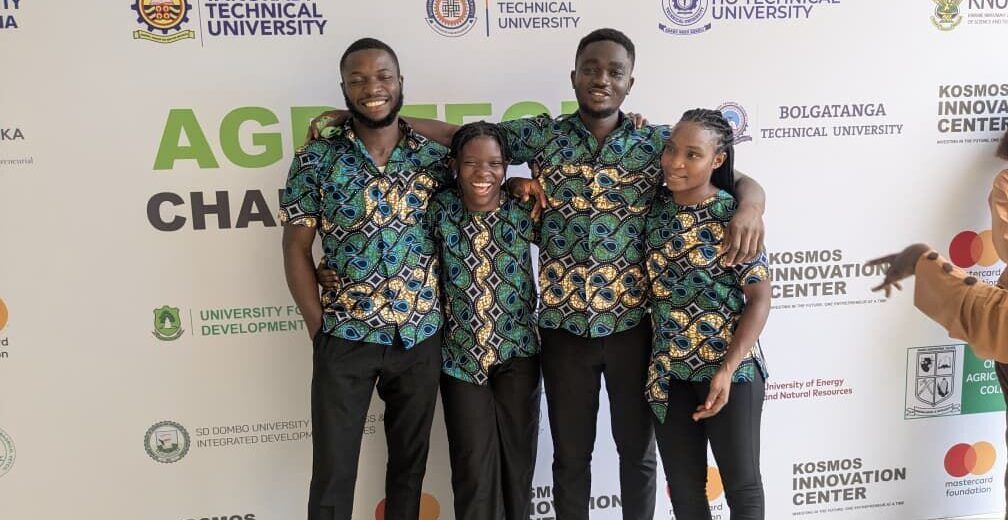
Sole Revolution: Young Innovators Turning Coconut Waste into Affordable Footwear
Four young Ghanaian students aged between 22 and 26 have struck a powerful chord at the intersection of innovation and impact, fusing technical ingenuity with environmental and social consciousness to solve the country’s looming crises. Meet Martin Kofi Tetteh, Monica Annim, Regina Pecku, and Wisdom Bama, who are transforming discarded coconut waste into stylish, locally crafted soles reminiscent of the iconic Birkenstock.
Their work challenges the existing reliance on foreign-made goods, particularly in Ghana’s footwear industry, and provides a compelling alternative grounded in community empowerment and ecological stewardship.
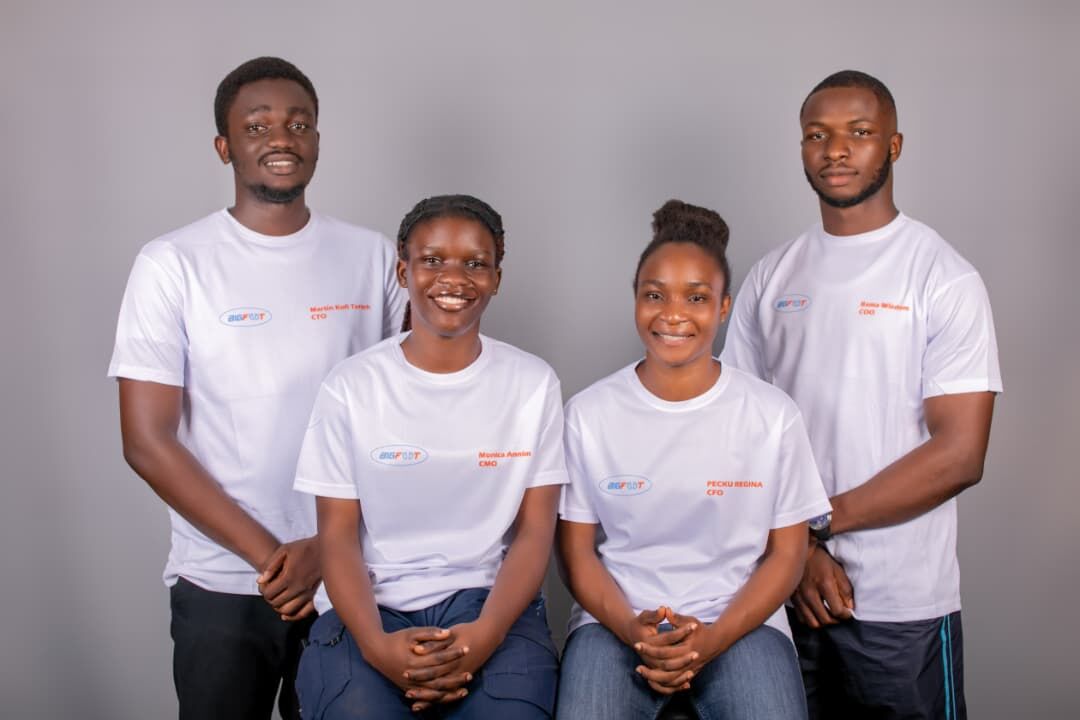
The four co-founders of Big Foot Company LTD.
The Problem Beneath Our Feet
Ghana’s streets, particularly in urban centers, overflow with mounds of discarded coconut husks, an often-ignored byproduct of one of the country’s favorite roadside refreshments. While some coconut vendors offload these husks to fishmongers and other food vendors for firewood, most end up in landfills or burned openly, releasing carbon dioxide and methane into the atmosphere.
“This process contributes to emissions that conflict with our goal for a sustainable future. We wanted to find a way to convert this waste into something of value, something that solves a real problem.” Explained Monica Annim, a 22-year-old Mechanical Engineering student and Marketing Officer.
That problem is acutely felt by Ghanaian shoemakers. Local artisans heavily depend on imported Birkenstock soles priced at a staggering GHS 58 per unit, making mass production expensive and erratic due to seasonal shipping constraints. For many, this means halting operations for weeks at a time.
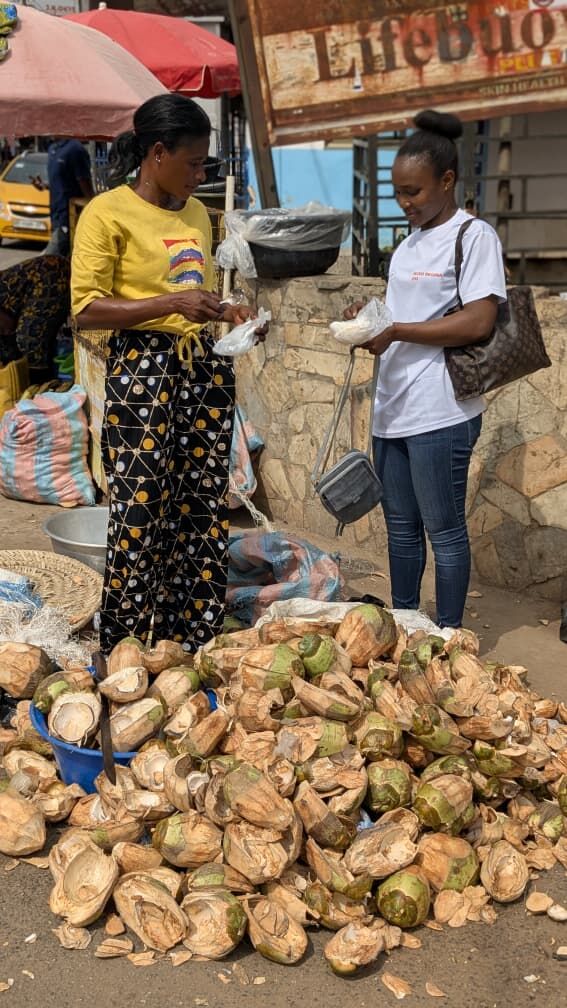
One artisan, known as Quababaa Quagrainie, confided in Martin and Wisdom about these frustrations during the team’s market research phase as part of the Cosmos Innovation Center’s Agritech Challenge- an initiative that propelled their idea from concept to a company.
“She said if we could help with an affordable and reliable local option, it would transform her business. That conversation stayed with us, as we began to explore”.
During the six – seven-month intense researching, sampling and training with the Cosmos Innovation Center program, the four students of Koforidua Technical University developed the Birkenstock-style soles an alternative and competitive footbed for shoemaker and artisans.
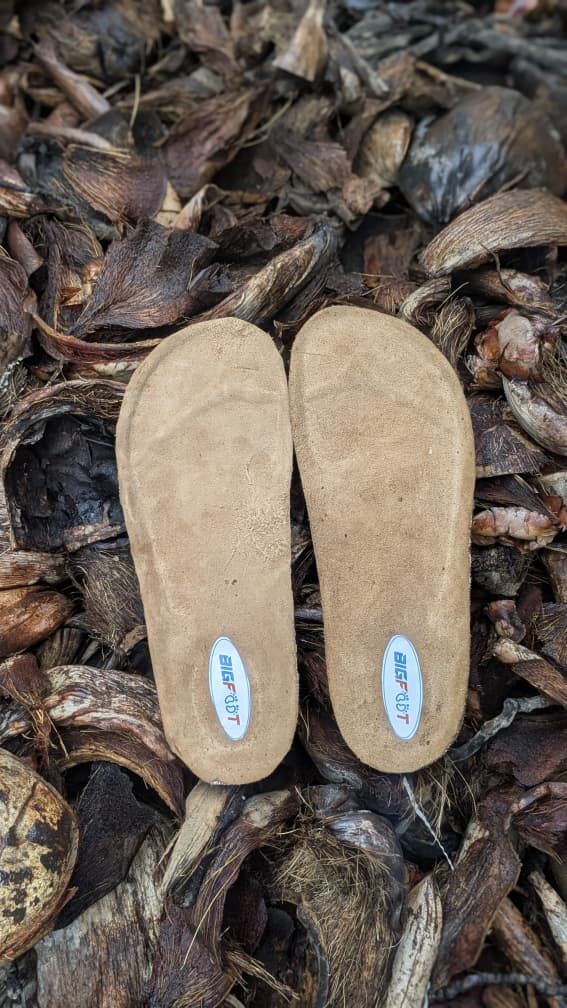
A Circular Ecological Journey
The four geniuses’ innovation is anchored in a waste-to-wealth philosophy. Coconut husks, sourced directly from street vendors, undergo a meticulous transformation. First sun-dried under protective tents, the husks are then chopped and milled using a machine co-developed with the mechanical engineering department at their university, which has been immensely supportive of their work. The resulting fiber is bound using eco-friendly natural latex and shaped into footbeds using custom-made molds.
“We use locally sourced rubber as our binding agent, making the entire product biodegradable and non-toxic. Each sole costs just GHS 25.60 to produce, less than half the cost of imported alternatives.” Martin explains.
This low-cost model is not only economically empowering for shoemakers but is also socially conscious. These young innovators now work with eight production assistants and four elderly women who help collect raw materials, many of whom are beneficiaries of the project’s early-stage job creation strategy.
Innovation Rooted in Impact
As of August 2025, their company has produced over 350 soles and established partnerships with more than 25 shoemakers across Koforidua. The reception has been warm, with an expected slow response in a market that gradually embrace unfamiliar alternatives.
“At first, most shoemakers asked for samples. But once they tested the soles, they came back asking for more.” Martin says.
Even members of the Kumasi Footwear Association have taken notice. A physically impaired shoemaker, who became one of their earliest champions, now collaborates with their outfit to assemble finished sandals. The geniuses assert this is a module to champion inclusivity and job creation and would be expanded in due course.
Feedback has been largely positive, especially on durability and comfort. While early iterations of the product were slightly heavier due to moisture retention during sun-drying, improvements in milling and drying have since optimized performance.
“The longer you wear them, the more the soles mold to your feet. It’s like a natural memory foam,” Martin explains with pride.
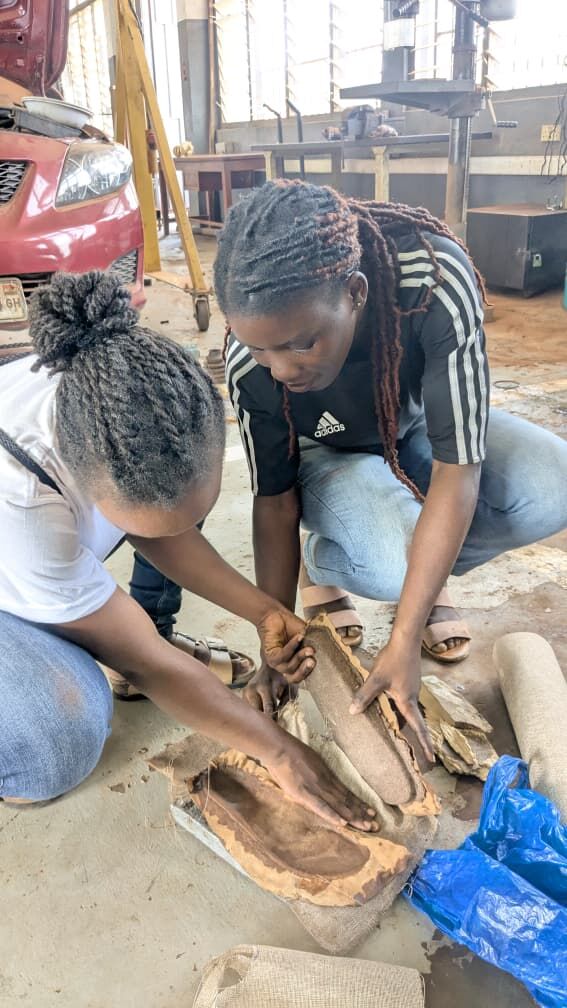
A Vision Beyond Soles
Their mission transcends selling foot wear soles. The team envisions a Ghana where waste is no longer wasted and young people are equipped with the skills to lead that transformation. Plans are underway to establish an apprenticeship model that trains youth in shoemaking and sustainable production.
“We want to build a system where we train, mentor, and equip young people to be self-employed. By 2028, we aim to create direct and indirect jobs especially for women.” says Monica.
Monica herself is living proof of the power of inclusion. Once a quiet student unsure of her entrepreneurial path, she now coaches junior innovators in programs like G-STEM, helping them refine their business models and pitch ideas.
“This whole journey has given me value I never knew I had. Now I’m guiding others to discover theirs.” she reflects
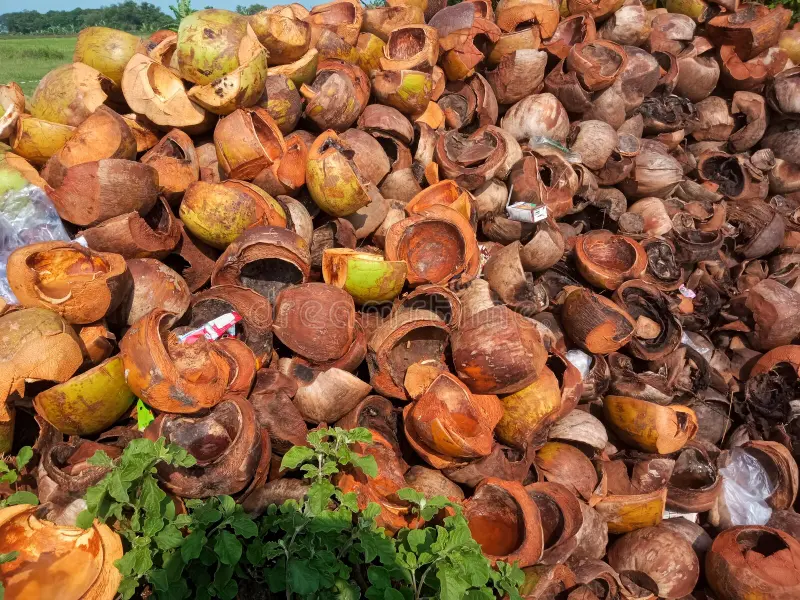
Sustainability in Every Step
The journey of these innovators are intricately linked with the Sustainable Development Goals (SDGs), as real-time benchmarks guiding their operations. Their commitment to gender equity is evident in Monica Annim’s leadership role and the team’s deliberate inclusion of women at every stage of production. It is a quiet defiance of gendered expectations within engineering and manufacturing sectors, echoing the ethos of SDG 5.
In tackling youth unemployment through local manufacturing and job creation, the initiative feeds directly into SDG 8. The project’s narrative of responsible consumption and production, repurposes what would otherwise be waste into essential goods advancing SDG 12 and perhaps most crucially, the environmental dividend of this work directly supports SDG 13: Climate Action, by reducing carbon emissions and advocating for regenerative systems.
These SDGs are active markers by which the team measures their advancement and impact.
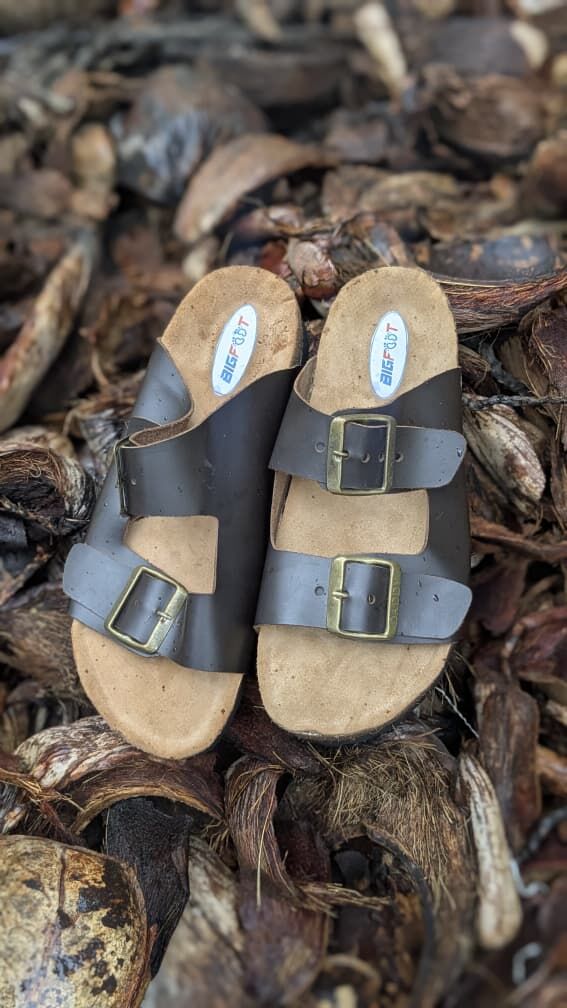
Challenges and the Road Ahead
Despite its early success, these young inventors face serious operational hurdles. Chief among them is the lack of industrial machinery. Sun-drying husks and using hand-built milling equipment restrict output to just 20 soles per week.
“With the right machinery like dehydrators, grinders, and better molds, we could triple our production. Right now, demand is outpacing our capacity.” Monica notes.
Funding remains another challenge. Though the startup received an initial seed capital from the Cosmos Innovation Center, ongoing operations are sustained through sales and personal sacrifice. The team made up entirely of students juggles lectures, exams, and full-time entrepreneurship.
“We’ve sacrificed our hobbies, social lives, even sleep. But we believe in what we’re doing,” says Martin.
Their vision is to scale production but most significantly improve quality and standardization, positioning Ghana-made soles on equal footing with global brands.
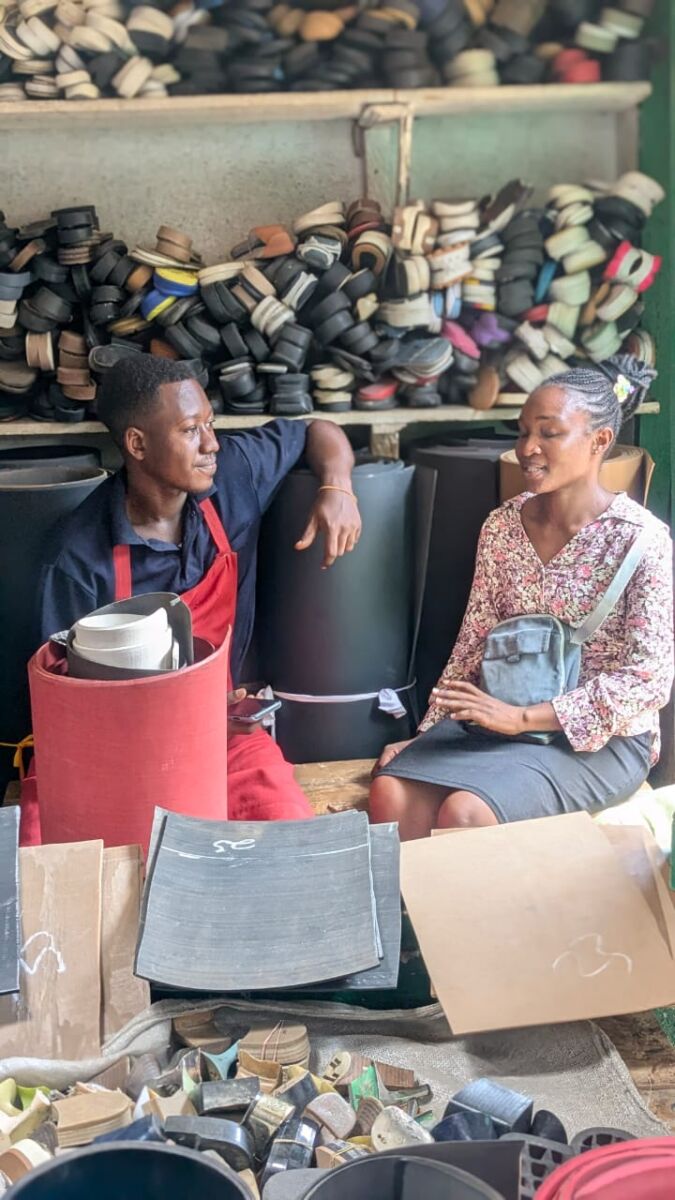
Conclusion: The Power of Local Genius
In an age where conversations about Africa often revolve around what is lacking, these young innovators are assertive answers to the future of endless possibilities. I believe the solution to Africa is engrave in the basket of the earth underneath our soles. Our problems are unfinished hymns with scattered letters waiting for the youth to word them into meanings. These young geniuses have begun a voyage of ecological consciousness and innovation however their plaintive cry is for support to lead this course and keep these dreams alive.

Leave a Reply